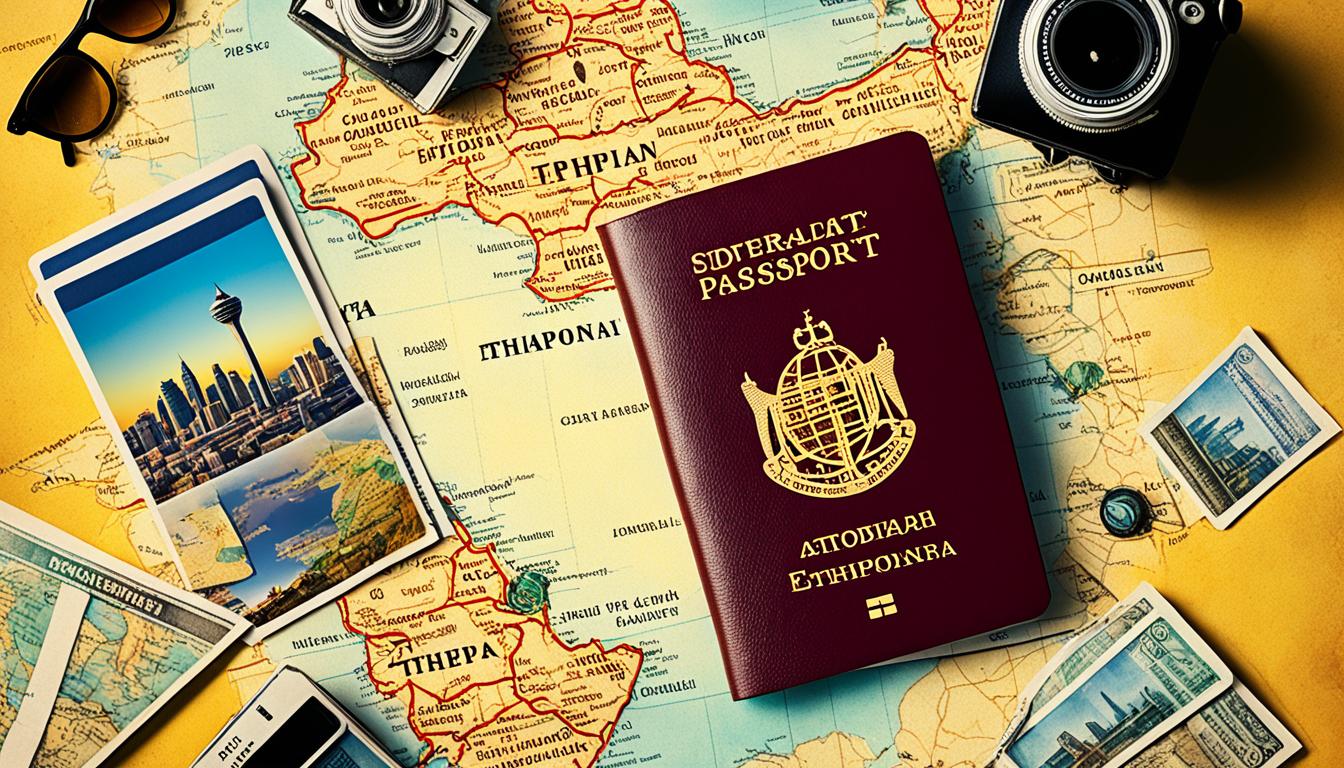Do You Need a Passport to Go to Addis Ababa?
Are you planning a trip to Addis Ababa, the vibrant capital of Ethiopia? Before you pack your bags, there’s an important question you need to answer: Do you need a passport to visit Addis Ababa? You might be surprised to learn that the answer is yes! A valid passport is mandatory for all visitors, including US citizens, who wish to enter Ethiopia.
The Ethiopian government requires that your passport be valid for at least six months beyond the date of your arrival in Addis Ababa. This means that if your passport is expiring soon, you’ll need to renew it before your trip.
Key Takeaways:
- Traveling to Addis Ababa requires a valid passport.
- Your passport should be valid for at least six months beyond your arrival date.
- US citizens are also required to obtain a visa to enter Ethiopia.
- Stay informed about the safety and security situation in Ethiopia before your trip.
- Take necessary precautions to ensure a safe and enjoyable visit to Addis Ababa.
Travel Requirements for Ethiopia
In addition to a passport, US citizens planning to visit Ethiopia need to obtain a visa. The Ethiopia eVisa is available exclusively online, allowing travelers to conveniently apply from the comfort of their own home. The eVisa application requires personal information, passport details, and travel plans.
Once approved, a printed copy of the eVisa should be presented upon arrival at Addis Ababa Bole International Airport, the only valid port of entry for eVisa holders.
Ethiopia Visa Options for US Citizens

When traveling to Ethiopia, US citizens have various visa options to consider. The most commonly used type is the single-entry visa, which allows visitors to stay in the country for a duration of up to 30 days. If travelers wish to extend their stay beyond this period, they have the option to apply for a new visa while still in Ethiopia.
Alternatively, for frequent travelers to Ethiopia or those planning multiple visits within a specific timeframe, the multiple-entry visa is a suitable choice. However, obtaining a multiple-entry visa requires following the conventional application process, which involves visiting the nearest Ethiopian Embassy or Consulate.
For those who are transiting through Ethiopia and have a layover exceeding 12 hours or wish to leave the airport premises, a separate eVisa for transit is required.
It is important to carefully consider your travel plans and choose the visa option that best suits your needs. Whether it’s a single-entry visa, multiple-entry visa, or a transit visa, ensure that you have the necessary documentation and comply with all relevant requirements.
Applying for a Single-Entry or Multiple-Entry Visa
If you plan on staying in Ethiopia for an extended period, whether it’s for leisure or business purposes, a single-entry visa may not be sufficient. In such cases, it is recommended to apply for a multiple-entry visa, which allows for multiple visits within a specified timeframe. To obtain a multiple-entry visa, you will need to visit the nearest Ethiopian Embassy or Consulate and follow their application procedures. Be sure to provide all the required documentation, including a valid passport, visa application form, and any supporting documents requested.
Transit Visa Requirements
For travelers who are transiting through Ethiopia and meet the criteria for a transit visa, it is important to apply for an eVisa for transit purposes. This is necessary if your layover in Ethiopia exceeds 12 hours or if you plan to leave the airport during your transit. Applying for the transit eVisa can be done online, and it is recommended to apply well in advance of your travel date to allow for processing time.
Keep in mind that visa requirements and regulations can change, so it is essential to check the official website of the Ethiopian Embassy or Consulate for the most up-to-date information. By planning ahead and familiarizing yourself with the visa options available to US citizens, you can ensure a smooth and hassle-free entry into Ethiopia.
Travel Safety and Security in Ethiopia

When planning a trip to Addis Ababa, it is important to be aware of the safety and security situation in Ethiopia. The country has experienced sporadic civil unrest and terrorist threats, with terrorist organizations planning attacks against US citizens and Western interests.
Travelers should exercise caution, avoid high-profile public events, and locations frequented by tourists. These areas are more prone to potential security risks. It is crucial to remain vigilant at all times, keeping personal safety a top priority.
Additionally, precautions should be taken to prevent theft, as pickpocketing, theft from vehicles, and other petty crimes are common in Addis Ababa. It is essential to secure personal belongings and be mindful of the surroundings. Travelers are advised to keep an eye on their belongings, especially in crowded areas, markets, and public transportation.
Safety Precautions
Here are some safety precautions to consider while visiting Addis Ababa:
- Avoid displaying valuable items, such as expensive jewelry and large amounts of cash, to reduce the risk of theft.
- Stick to well-lit and populated areas, especially during the nighttime.
- Use reputable and licensed taxis or ride-hailing services for transportation.
- Stay informed about the current security situation through local news and official travel advisories.
- Keep a photocopy of your passport and important documents in a safe place, separate from the originals.
- Share your travel itinerary and contact details with a trusted friend or family member.
- Be cautious when accepting invitations or offers from strangers, as they may have ulterior motives.
By following these safety precautions, travelers can minimize the potential risks and enjoy a safe and memorable trip to Addis Ababa.
Travel Restrictions and Conflict Zones in Ethiopia
When it comes to traveling to Ethiopia, it is crucial to be aware of the travel restrictions and conflict zones in the country. The US government has implemented specific travel restrictions for Ethiopia, which include avoiding national border regions, Gambella, Benishangul Gumuz, areas in the western and southern parts of Oromia region, Tigray region, and Amhara region.
One of the conflict zones is the Tigray region, which is currently experiencing ongoing conflicts. The security situation in this region and the border with Eritrea is considered to be volatile, with frequent incidents of inter-ethnic conflict and criminal activity reported in the border areas shared with Kenya, South Sudan, and Sudan. Due to these reasons, it is strongly advised for travelers to avoid these conflict zones and stay informed about any changing conditions.
Crime and Safety Precautions in Addis Ababa
Addis Ababa, like any major city, has its share of crime. Travelers should be cautious and take safety precautions to minimize the risk of theft, including pickpocketing, purse snatching, and theft from vehicles. It is recommended to avoid walking alone, display cash or valuable personal property, and secure belongings.
Demonstrations occur frequently and can turn confrontational, so it is advised to avoid areas around protests and stay informed through local media. It is important to stay alert and follow the advice of local authorities for personal safety.
Emergency Assistance and Support for US Citizens
In case of emergency or victimization, US citizens in Addis Ababa can seek assistance and support from the US Embassy. Our priority is to ensure the safety and well-being of all US citizens traveling or residing in Ethiopia.
If you require emergency assistance, our dedicated team is available 24/7. We can assist you in finding appropriate medical care and help you navigate the healthcare system in Addis Ababa. Additionally, if you are a victim of a crime, we can guide you through the process of reporting the incident to the local police.
We understand the importance of staying connected with your loved ones during difficult times. If you need to contact relatives or friends back in the United States, we can provide the necessary means to make communication easier for you.
Legal matters can be complicated, especially in a foreign country. If you require information on local attorneys or legal advice, our team is here to assist you. We can provide guidance and resources to help you navigate the legal system in Ethiopia.
In exceptional circumstances where you may require financial assistance, such as emergency repatriation or limited medical support, the US Embassy can offer emergency loans to eligible US citizens.
To ensure that we can provide you with timely and relevant information, it is important to register with the nearest US embassy or consulate. By doing so, you will receive important safety updates and be easily reachable during any unforeseen events.
Remember, support and assistance are just a phone call away. Reach out to the US Embassy in Addis Ababa if you need any emergency help or support during your time in Ethiopia.
Conclusion
Traveling to Addis Ababa, the capital of Ethiopia, is an exciting experience that requires proper documentation. If you are a US citizen planning a trip, remember to have a valid passport and obtain the necessary visa to enter Ethiopia. It is essential to stay informed about the safety and security situation in the country before your journey.
When traveling to Addis Ababa, it is important to take certain safety precautions. Avoid high-risk areas and be vigilant of your surroundings. As in any major city, petty crimes like theft and pickpocketing can occur. Keep your valuables secure and be cautious when walking alone. Additionally, stay updated on local news and avoid public events or locations that may be targeted by potential threats.
To ensure a safe and enjoyable trip, consider registering with the nearest US embassy or consulate before your departure. In case of any emergency or victimization during your stay in Addis Ababa, they can provide valuable assistance and support. It is also advised to have emergency contact information readily available and to share your travel itinerary with a trusted friend or family member.





